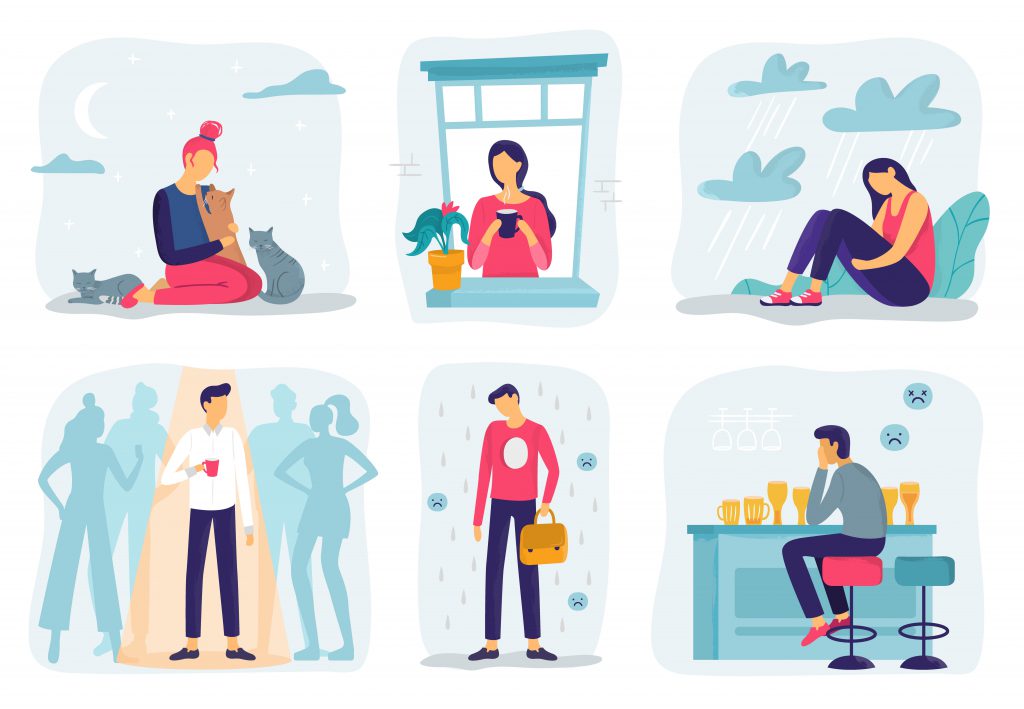For many, Christmas is a time for connecting with friends and family, enjoying festive meals and exchanging gifts. But, sadly, this experience of Christmas time is not the same for everyone. A focus on socialising, thoughtful acts and family events can make the festive period particularly difficult for those who are struggling to feel connected to others. In order to understand how loneliness may impact individuals during the Christmas season, EDIT Lab PhD student, Alicia, and placement student, Emma, met with loneliness researcher Tim Matthews to discuss the effects of feeling lonely and approaches to help overcome those feelings.
1. What is loneliness?
Loneliness is a distressing feeling that arises when the social relationships that you have do not match up to the social relationships you would like to have (see our past blog,‘L is for loneliness’ for more on this!). It’s important to remember that loneliness is not about being alone, but rather it is about feeling that you are alone. Loneliness is subjective, a person can still feel lonely even if it seems that they have many social relationships; on the other hand, a person who enjoys being on their own may not be lonely even if they have little social contact. It is the discrepancy between the social contact that you want and that you actually have that can lead to people experiencing loneliness.
2. Who can experience loneliness?
Loneliness can be experienced by people of all backgrounds and all ages. Despite it being regularly assumed that loneliness only affects older adults, it is also commonly experienced by young adults aged 16-24. Loneliness is often associated with transition periods in life, possibly because these changes come hand in hand with a change of social group. Many people are aware of loneliness in older people due to events that commonly occur in later life, such as the death of a spouse or declining mobility. These events can cause significant changes that may result in older adults losing companionship and feeling lonely. However, young people also go through similar transitions. Events such as changing schools, starting university, or moving to a new town can mean being further away from family and friends and so these are often times of loneliness too.
“Loneliness can be experienced by people of all backgrounds and all ages.”
3. What impact can loneliness have?
Being severely lonely is associated with a tendency to experience problems in other areas, including difficulties with mental health, employment, and physical health.This may be due to severe loneliness taking a physical toll on the human body over time. The distress of ongoing loneliness can cause the bodies stress response systems to be working in overdrive, which can impact the immune system and sleep patterns causing downstream effects on physical health. Given its impact on emotional and physical wellbeing, loneliness should be taken seriously and it is important that people who feel lonely do not suffer in silence.
4. What is the link between Christmas and loneliness?
It isn’t that loneliness is solely a product of festive periods, since it can be experienced all year round. However, over Christmas there is much more of a focus on socialising and connecting with family or friends. This emphasis on socialisation can make people become more aware that they are feeling lonely because the disparity between the relationships individuals want, and the ones they actually have can become more apparent. Seeing others connecting more with friends and family may increase the feeling that you are lacking those connections yourself.
5. How can feelings of loneliness be overcome?
The simplest way to help overcome feelings of loneliness is to go out and meet new people, or make an effort to reconnect with people you may have lost touch with. Although this may seem hard, there are a lot of initiatives in place to help with this. For example, charities frequently organise events to help bring people together, such as coffee mornings or volunteering activities. Starting In 2017, the Alexandra pub in Wimbledon opened its doors to anyone who was alone on Christmas day. Those who came were given a free Christmas dinner and the opportunity to socialise and meet new people. No one who attended sat alone and there was a huge age range, with an estimate of ⅓ of the people who attended being under the age of 30.
“No one who attended sat alone”
The important thing about events like these is that once people are there, they need to actively work to challenge the negative pattern of thinking caused by loneliness. There is a tendency for lonely people to have a bias towards thinking that they are being judged, that they will have nothing to talk about or that they will get nothing out socialising. Due to this, it is important that people are open to new situations and experiences. In some cases, it is advised that individuals seek counselling or psychological therapy to help them tackling his approach of thinking towards social encounters. Therapy can be accessed through speaking to your GP, self referral through the NHS or by doing an online course.
6. What can I do if I feel lonely ?
The first step in tackling loneliness is to make sure you start small, by simply making yourself socially available. This can help to build up confidence and help put you in an optimistic mindset about social situations. A good starting point could be reading out for family members or starting a conversation with a coworker. Once you feel confident enough, a good way to socialse could be to volunteer for a charity because these tend to be open and non-judgmental environments.
Over the past few years, loneliness has become more recognised as a public health concern. There is now a Minister for Loneliness and a government policy in place to help combat loneliness in people of all ages. With this work and with public awareness of loneliness on the rise, we are hopeful that the stigma surrounding loneliness will decline and those affected will feel more comfortable speaking up.
Remember: You are not alone.





